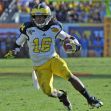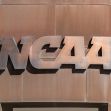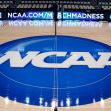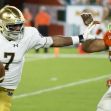Louisiana State University (LSU) made $92 million in football revenue last year, netting a $56 million profit. Joe Burrow, its Heisman Trophy-winning quarterback, received an athletic scholarship to LSU, worth approximately $40,000, the cost of attending college as an out-of-state student. This week, the Supreme Court granted an appeal, and just one day later, Members of Congress introduced a bill that could change the financial future of every next-gen Burrow and all their teammates forever.
While the current Supreme Court case has nothing to do with Burrow, it is worth noting that after graduation, he signed a $36.1 million 4-year rookie contract with the Cincinnati Bengals. In his 11th game for them, he tore his ACL. Most likely, if he had sustained this injury while in college, he would not have received a lucrative NFL contract. He might have played and won all those games for LSU and, while the school made millions, he would have had just the bare-bones cost of his education to show for his hard work and winning record when his college days were over.
The current Supreme Court case stemmed from a different athlete, West Virginia football player Shawne Alston, whose legal journey began in 2014 when he brought an antitrust suit against the NCAA and five college sports conferences in federal district court in California. Alston sought unspecified damages based on the difference between actually attending college and an athletic scholarship that only covers tuition, fees, room, board and books, and none of the other student necessities, such as computers or travel home for Christmas. That monetary difference, when applied to every Division I athlete, is significant, especially given the triple damages awarded in antitrust cases.
Alston won his case, which evolved into a class-action suit when joined by a group of current and former athletes. They argued that the NCAA’s restrictions on compensation for college athletes violate antitrust provisions that make it illegal to restrain competition for talent and labor.
The NCAA appealed, and the US District Court sided with college athletes in 2019 when U.S. District Court Judge Claudia Wilken found that NCAA’s limits on non-cash benefits for education-related expenses like laptops, science equipment, study abroad programs, graduate school, musical instruments and other tangible items were unlawful. She issued a permanent injunction on rules that imposed these restrictions. A three-judge panel of the U.S. Court of Appeals for the Ninth Circuit affirmed that decision in May 2020. The NCAA appealed to the U.S. Supreme Court.
The NCAA’s appeal urged the Supreme Court to reverse the Ninth Circuit because upholding its ruling would “fundamentally transform” college athletics by “blurring the traditional line between college and professional athletes.” The NCAA’s chief legal officer Donald Remy released a statement that said, “It is critical for the Supreme Court to address the consequential legal errors in this case so that college sports can be governed, not by the courts, but by those who interact with and lead students every day.”
The NCAA’s appeal argues that the Ninth circuit’s decision does not properly apply antitrust law. It cites the decision in NCAA v. Board of Regents, which centered on control of college football television rights. The high court’s 1984 opinion included the now-controversial statement “in order to preserve the character and quality of the (NCAA's) 'product,' athletes must not be paid, must be required to attend class and the like."
This language has been used in several federal cases to create a body of law that maintains the NCAA’s current rules. However, Judge Wilken relegated the key sentence to “dicta,” a term that indicates the language is an individual opinion and not a binding precedent.
The athletes, however, countered by arguing the unfairness of the billions of dollars that colleges and conferences receive annually as a result of what Wilken called their “hard work, sweat and sometimes broken bodies,” while also noting the generous salaries given to coaches and athletic directors. It cites illegal inter-college agreements that limit what student-athletes can receive.
This case, while significant, does not go as far as several current Congressional proposals, which would give student-athletes the ability to monetize their names, likenesses and images. For example, the College Athlete Bill of Rights, introduced just one day after the Supreme Court agreed to hear the Alston case by Senator Cory Booker (D-NJ) and three other Democrats, is much more sweeping.
In addition to allowing college athletes to profit off their names, images and likenesses, it also requires colleges to share 50% of their revenue with them, requires more scholarships and choices of majors, removes transfer restrictions, covers medical costs for up to five years post-graduation, and requires health and safety standards, especially those related to traumatic brain injuries and sexual assault. It would also create a Commission to watch over college sports.
"This is one of the few industries in America that is allowed to exploit those who are responsible for generating most of the revenue," Booker told ESPN. "I feel like the federal government has a role and responsibility that we've been shirking in terms of protecting athletes and ensuring their safety. I just really believe there is an urgency here that has not been met for decades and decades. We need to step up and do something about it."
Booker’s bill is one of seven that have been introduced in Congress. The NCAA has commented that it would prefer federal legislation to having to comprehend and comply with different laws in each state. In fact, it has asked members of Congress for assistance in creating a national law to govern how college athletes can sell their names, images and licenses.
The NCAA’s approach, however, is narrower than the one introduced by Booker. In October they announced their own rule changes that would allow student-athletes to receive compensation for third-party endorsements both related to and separate from athletics, and provided a few other opportunities related to payment for social media and other business opportunities.
The Ninth Circuit’s much less inclusive ruling would not mandate any particular benefits, and conferences would be allowed to impose restrictions that their members wanted. However, they would not be allowed to act in concert so conferences would likely be forced to compete with each other in order to get the best players.
The NCAA’s chief legal officer Donald Remy released a statement that approved of the Supreme Court’s decision to hear its appeal. “We are pleased the U.S. Supreme Court will review the NCAA’s right to provide student-athletes with the educational benefits they need to succeed in school and beyond, he said. “The NCAA and its members continue to believe that college campuses should be able to improve the student-athlete experience without facing never-ending litigation regarding these changes."
Senators say that there could be floor votes on one or more of the bills related to college athletics in the next six months.






